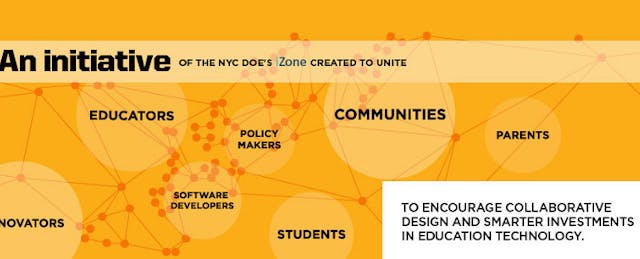There’s a new “incubator” in town quietly chipping away at traditional edtech product development. Startups don’t receive A-list celebrity mentorship (instead, they are the mentors), office space, server credits or seed money. The preferred currency here is defined by information and exposure, not dollars and cents.
But there’s still the ever-important, all-encompassing pitch. Only in this incubator, developers aren’t worried about hooking new investors with promises of billions in revenue. Instead they’re learning to talk about a different set of “sticky features”: the administrators, teachers, students, and school culture that will define the success of their product. In return, educators are crafting product pitches in order to understand the goals, aims, and challenges of startup life.
Such co-development of elevator pitches is just one of many bridge-building activities taking place between educators and entrepreneurs as the second phase of Innovate NYC Schools (iNYCS) kicks into gear. The incubator-of-sorts started this spring in the form of The GapApp Challenge, an open call to startups and developers to help close skill gaps in middle school math. (We wrote about it here, too.) Now twelve participating companies are piloting their products in partnership with teachers at NYC iZone schools.
But it’s not really a pilot.
Mirroring thoughts expressed by SRI International leadership earlier this year, iNYCS is much more interested in ironing out the kinks of implementation--support, customer relations, communication, procurement, etc.--than rushing forward to prove that one learning product is superior to another. Accordingly, Executive Director Steven Hodas and company are striving to build an environment where educators and entrepreneurs can engage in open dialogue in a safe space; a place where entrepreneurs aren’t immediately worried about the next procurement cycle and where educators build a sense of agency in the products they use.
It’s kind of like those crazy spaces popping up around the country where tech entrepreneurs can more directly access their target users and develop their products without fear of catastrophic failure.
It’s an incubator.
The five-month process, which kicked off in late September with an all-hands prototype-a-thon, is also part-research study. For every teacher who is iterating products alongside developers, there’s another conducting his or her classroom business-as-usual. “The hypothesis," Hodas says, "is that if you put teachers and developers together collaboratively for a long period of time, each of them will change.” That is, developers will create inherently better products and teachers will develop the entrepreneurial mindsets necessary to change their practice in an increasingly technological classroom.
It’s not exactly rocket science. Then again, maybe it is.
Entrepreneurs and teachers, though both dedicated, quick-witted, agile, and overworked, operate under very different constraints. For the entrepreneur, time is of the essence. There’s time for development, time for fundraising, time for hiring, time to get ahead of the competition. Always a lot to do and not enough time. And when time runs out, having exhausted all options, the hard-headed entrepreneur throws up his or her hands, sulks (briefly), and considers ways to start over. There isn’t much fear of failure.
Educators also cherish time: for robust pedagogy, checking for understanding, feedback, professional development, peer evaluation, socio-emotional support, testing, testing, and testing. But when time runs out, the gavel falls hard--especially for students who will move forward without the requisite skills and knowledge. The fear of failure is very rational and real.
Understanding such challenges, iNYCS is dedicating the first two months solely to building relationships and mutual understanding between the twelve companies and nearly 30 teachers.
Whether through consistent in-person meetings or cross-country Skype calls, teachers are expected to get really, really familiar with the products while developers work towards understanding school culture and conditions. Seriously: there are even homework assignments. (No word yet on the grading scale).
The remaining months are a bit more business-like as teachers and developers co-deliver plans for future product development, and hold seminars for developers to get cozy with the NYC procurement process. There’s even an experimental API up and running for participating developers to keep class roster data in sync (yep, it’s FERPA compliant).
Whether or not iNYCS succeeds in the traditional sense --namely, raising test scores-- is secondary to the catalogue of barriers and enablers it should produce for similar work in other districts, and for NYC schools moving forward. Benchmark tests have been administered for quantitative analysis in the research study, but there’s also a ton of qualitative data being captured: teacher confidence measures and approaches to problem-solving, knowledge of products, blog posts, and most impressively, an online collaboration space and portfolio documenting the interactions between developer and teacher.
Hodas is well aware that the entire process is akin to opening Pandora’s box. “It’s a Trojan horse for many, many things. It requires people to think about systems and structures in ways that they’ve never done before,” he says.
But if classrooms are to remain relevant to the world beyond school walls, then such messy, complex processes are absolutely necessary to transition into the ever-elusive education 2.0/3.0 world that everyone imagines.


